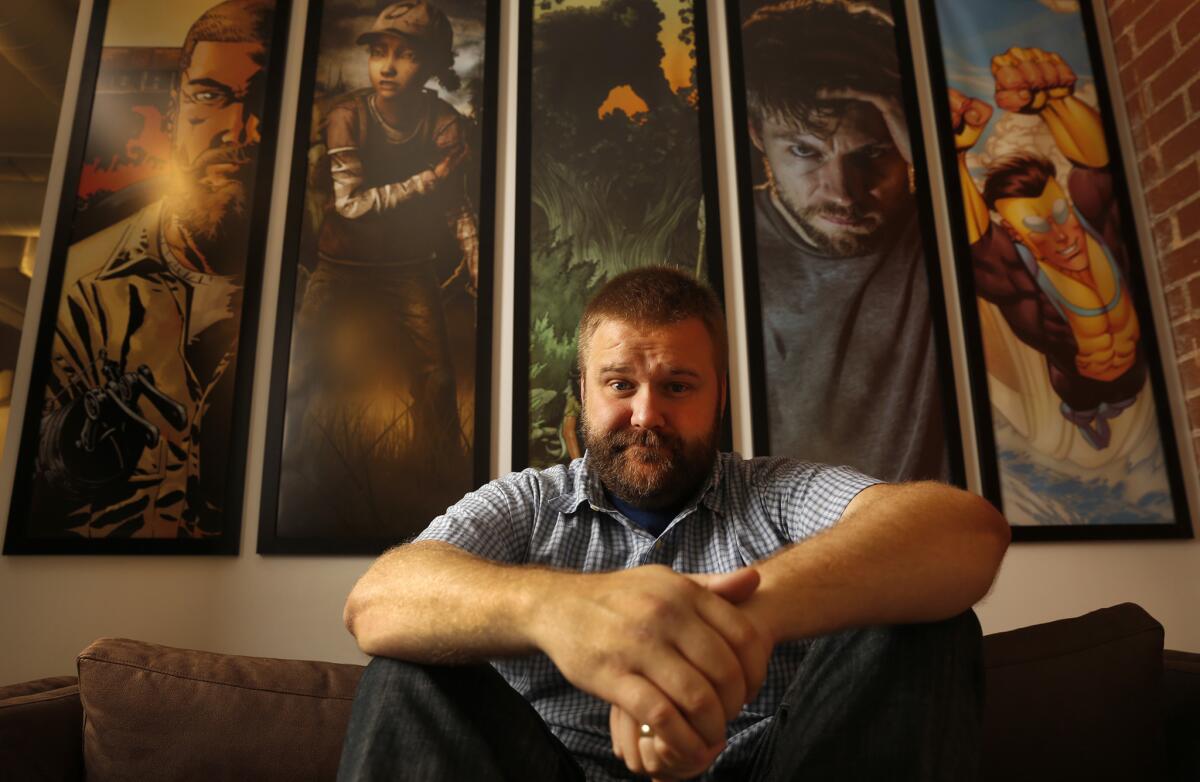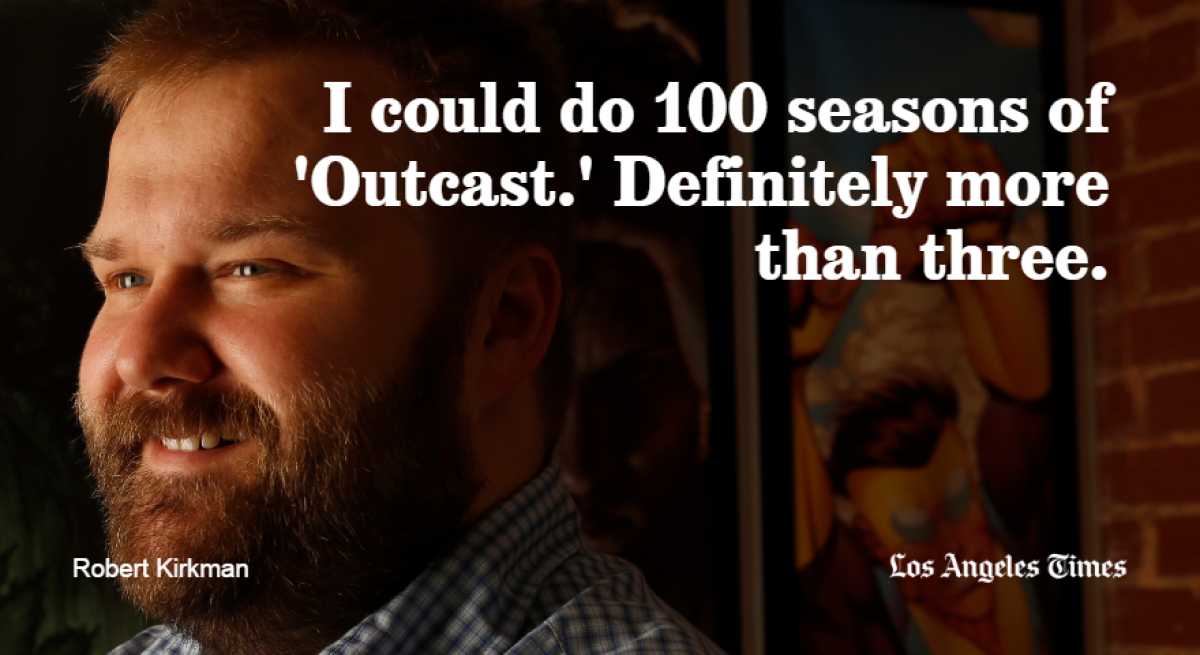Q&A: ‘Walking Dead’s’ Robert Kirkman on being drawn to evil once again on ‘Outcast’

- Share via
A lot has changed since Robert Kirkman arrived in Hollywood from his native Kentucky in 2010.
That’s when he launched the television show “The Walking Dead” based on his “Walking Dead” comics. The AMC series was so successful he made a spinoff series, “Fear the Walking Dead.”
Meanwhile, he penned several new comic titles, including the supernatural series “Outcast,” which is also Kirkman’s newest television project. It begins Friday on Cinemax.
People are expecting big things from “Outcast,” which has all the tenets of a Kirkman success: It’s set in the South. It deals with supernatural threats in a realistic manner. And it doesn’t shy away from violence. Kirkman is excited to explore the giant world he’s constructed with vomiting demons, possessed housewives and inexplicable evil goo.
But how can this series stand out from the current crop of possession thrillers? What has the executive producer Kirkman learned in the six years since his first successful comic-to-TV adaptation? And how will those lessons affect this new thriller, which stars Patrick Fugit as the reluctant exorcist Kyle Barnes?
We spoke with the creator inside the new Culver City headquarters for Skybound, the production company he started in 2008, about the future and the past of his TV empire, and how he’s spun comics into TV gold.
Why were you drawn to this supernatural, slightly religious Southern possession story?
It’s a region that interests me, the region I’m from, and so I think most everything I do will probably take place in small towns in some way, shape or form. I think Kyle Barnes’ story is kind of like “The Walking Dead.” It’s something that’s in a way unrelatable and unrealistic and completely bizarre. But at the same time, the kind of problems he has are somewhat universal. So you put demons in something and have it be scary and cool and that’s exciting, but really we’re just talking about this guy’s struggle to lead a normal life.
That’s the kind of stuff that interests me. The demon stuff is just icing on the cake.
Do you enjoy setting up the basic supernatural rules you have for the show?
Yeah. The rules and the mythology in these stories, that’s the real legwork. If you do your job right and construct a well-rounded universe, the stories to a certain extent almost write themselves.
Did you know that going into “Walking Dead”?
It’s something I probably figured out as I was going along with “Walking Dead.” As far as zombie rules and mythology, there’s a lot of stuff in pop culture that’s already established, but “Walking Dead” was kind of a process of picking and choosing the best aspects of zombie fiction and deciding what we pull in and what we don’t.
“Outcast” was definitely a little bit more of taking what we know from exorcist fiction and demonic possession, and trying to tie them all together and make something logical come out of it.
What are the struggles in making “Outcast” and its magical elements feel real and tangible?
In “Walking Dead,” you have to go, “Well I guess dead people come back to life now.” Aside from that, everything else is completely realistic. With this one, there are slightly more involved aspects of demonic possession and things like that. The most fun thing about this is that there’s a large portion of the population who believes that demonic possessions are a real thing. There’s a staggering amount of eyewitness accounts and very strange stories out there that I think lend “Outcast” a sense of being more realistic than “Walking Dead.” Because whether or not you believe that demons are actually behind this, you see strange behavior in people that tends to go unexplained. I think it makes it scarier because there is no chance that zombies are going to come back to life, but who knows, I could get possessed tomorrow.

On “Outcast,” this nefarious creator, whatever it is, has motive, it has drive. But “The Walking Dead’s” walkers have no motive besides feeding. How was that different for you as a writer?
It’s interesting because zombies are kind of a tangible threat, but they’re an unintelligent, unmotivated threat. As we get deeper and deeper into the world of “Outcast” we’ll see that this is an organized, malicious, intelligent thing that is definitely trying to achieve something. While it’s not tangible, because it isn’t necessarily in the physical realm until it’s inside of a person, it’s a lot more threatening.
“Walking Dead” is on its seventh season. Do you have seven seasons planned for “Outcast?”
I could do 100 seasons of “Outcast.” Definitely more than three. There is an arc I’m working toward. This is possibly the first project I’ve started where I’ve known exactly what the beginning, middle and end is. I don’t know how long the beginning, middle and end are, but I do know what we’re working toward in both the comic and the show.
Now that you’ve spent time making television, how did that change your creative process on “Outcast”?
I’m a little bit more comfortable with it. Every time I would write a script for “Walking Dead” I had to learn the format and learn the way that you write television because they are very different [from comics]. In comics you’re just reading words. You kind of have to write in snapshots because it’s all still images that are telling a story. It was very difficult for me to train my brain to write moving images. You can do a lot more when there is movement.
How long have people been hounding you for another show?
I almost sold the show by accident because in between the first season and second season of “Walking Dead,” Sharon Tal Yguado at Fox International was asking me, “What else do you have?” I just casually started talking to her about this comic book project that I was going to start at some point in the undefined future, and she said, “Yeah, yeah, yeah let’s do that.” It was the first time anybody ever launched a show in the U.S. and overseas at the exact same time.
Really we’re just talking about this guy’s struggle to lead a normal life. The demon stuff is just icing on the cake.
— Robert Kirkman
When AMC released the first image of “The Walking Dead” cast at Comic-Con, it was a big deal because comic readers had been with these characters for so long. Suddenly there was a real-life Glenn, Rick and Dale. “Outcast” is mostly centered around one person, the character Kyle Barnes, played by Patrick Fugit. Does it feel different launching a series with one face versus a large cast?
Yeah. We didn’t have 75 issues. If we had 75 issues of “Outcast” there would be a more established big cast. But there is a very talented, great ensemble cast with Philip Glenister and Wrenn Schmidt and Brent Spiner, Reg E. Cathy and David Denman. At “Walking Dead,” there’s more of an ensemble story. I would say Rick is the center of the story for the most part, but it’s about all of these people leaning on each other for survival. “Outcast” is a little more singular in that it focuses on Kyle’s journey.
It’s about this guy who’s been plagued by demonic possessions his entire life, who’s trying to get his life in order. He’s trying to figure out what it is that’s wrong with him. Why he’s been affected by this. Why people around him seem to be susceptible to this phenomenon, if he is in fact the cause of it ... just so he can get back together with his wife and try and live a normal life.
But he gets drawn into this larger conflict that has world-ending ramifications, and so it becomes a bigger story that involves more and more people. But it’s always about Kyle’s perspective. Patrick can handle it. He’s talented.
Did you go after Patrick originally?
There was a wide net cast. Patrick was one of many people who came in. Chris Black, the show runner, had done a pilot with Patrick, and was like, “He’s great. I definitely want him in the mix.” This almost-famous kid. I don’t think “Gone Girl” had come out yet. I made sure to see “Gone Girl” during the casting process.
The thing that was difficult in casting Kyle is that he’s one character in the pilot, but in the series he needs to be a much different character. Most actors were coming in with this very dower, very reserved, very insular portrayal that didn’t have a lot of character stuff that you could latch onto. Patrick was pretty much the only one who inhabited the character, who showed us that this is somebody we could be invested in, that we could follow for many, many years.
And he went out and read the comic. That was a big deal because a lot of people come and in and they’re like, “What’s this thing?” Patrick had actually gone to a comic book store because we only gave him the first script and a little bit of information, and he was like, “I know this is a comic. I’m going to cheat.” So he went out and bought all the comics that had been published and read up. I think that might have helped him see where the character was going a little bit better.
Why the decision to step away from the religious part of the possession?
With the Reverend Anderson character, we’re keeping the religious aspect alive, but I think through Kyle we are trying to look at it from a secular side. It’s a secularism-versus-religion conflict between Kyle and Anderson that I think makes them so interesting. Often Anderson appears to be right, and every now and then Kyle appears to be right. As you move through the season, you’ll see Anderson teaching Kyle or Kyle teaching Anderson. They almost have a Mozart-Salieri kind of relationship as the series goes on. Anderson has devoted his life to [exorcism] and has been very successful at it and then Kyle just kind of comes along and it’s like, “What? You just roll out of bed and do this stuff?” That will be fun.
In “Walking Dead,” you guys briefly toyed with the idea of explaining the virus for one episode. Are you going to explain the supernatural things in “Outcast” or is it just going to be something that we’ll have to have to figure out for ourselves?
“Walking Dead” isn’t a mystery show. “How did the zombies start?” That’s not important. That’s not what the characters are focusing on. They’re focusing on not getting eaten. But “Outcast” is about figuring out this world and what these things are. So you will be able to go back and watch the pilot episode and say, “Oh that’s why he’s levitating.” Setting those seeds early is a lot of fun, so yeah we will be finding out exactly what all this stuff is and what’s going on.
The “Outcast” pilot is a faithful adaptation of the first issue of the comic, even down to like the plaid pajama pants Kyle is wearing. Was that important for you?
Not really. There are times when I’m like, “Why not just get those pants? They look fine.” Ane Crabtree, the costume designer on the first episode, was really a big fan of the comic and the visuals of the comic so she did a lot of things to mirror things. I actually got those pajama pants at the end of the shoot, so that was fun. I should get them framed. But it’s not important to me to mimic the comic. I think that I like that the comic and the show can be separate things and that one informs the other.
Was it different writing in Kentucky versus writing in L.A.? Especially when you’re writing about the South.
Not really. I like to think that I have like a Kentucky embassy, so when you step on my property around my house you’re basically in Kentucky.
After “Walking Dead” there were a lot more zombies on television. But you guys were first. Whereas for “Outcast,” there have been a bunch of demonic possession series lately, including “Supernatural.”
I shouldn’t have taken four years to write the pilot. What I love about modern television is that there are a lot of genres that only existed in movies. They’re being brought into television because the audience has expanded and different networks are taking different risks. So it’s not just cop shows, lawyer shows and doctor shows. I think the fact that anyone who is a fan of exorcism movies can watch a 10-hour exploration of that theme and have somebody go deeper than you could ever do in a movie is great. So as a fan I’m excited about all of these different shows. Viewing them as competition, it is a little frustrating to see all of these different things coming out around the same time. But I’m happy that, based on what I’m seeing, everyone else is doing straight exorcism stuff.
I feel what we’re doing is extremely different. This isn’t a case of the week; there’s no Catholicism. We’re playing within the genre and we’re playing up to people’s expectations, but I think we subvert those expectations more than we actually live up to them. It’s a new way of doing an exorcism story.
‘Outcast’
Where: Cinemax
When: 10 p.m. Friday
Rating: TV-MA (may be unsuitable for children under the age of 17)
MORE ON HERO COMPLEX
In the studio where ‘Hellboy’ is made: Mike Mignola says goodbye to his giant demon baby
The ‘Preacher’ twist too disgusting for Seth Rogen and Evan Goldberg and Joe Gilgun’s vampire glee
With ‘X-Men: Apocalypse’ and ‘Game of Thrones,’ Sophie Turner is coming into her own
On Twitter: @MdellW
More to Read
The biggest entertainment stories
Get our big stories about Hollywood, film, television, music, arts, culture and more right in your inbox as soon as they publish.
You may occasionally receive promotional content from the Los Angeles Times.











